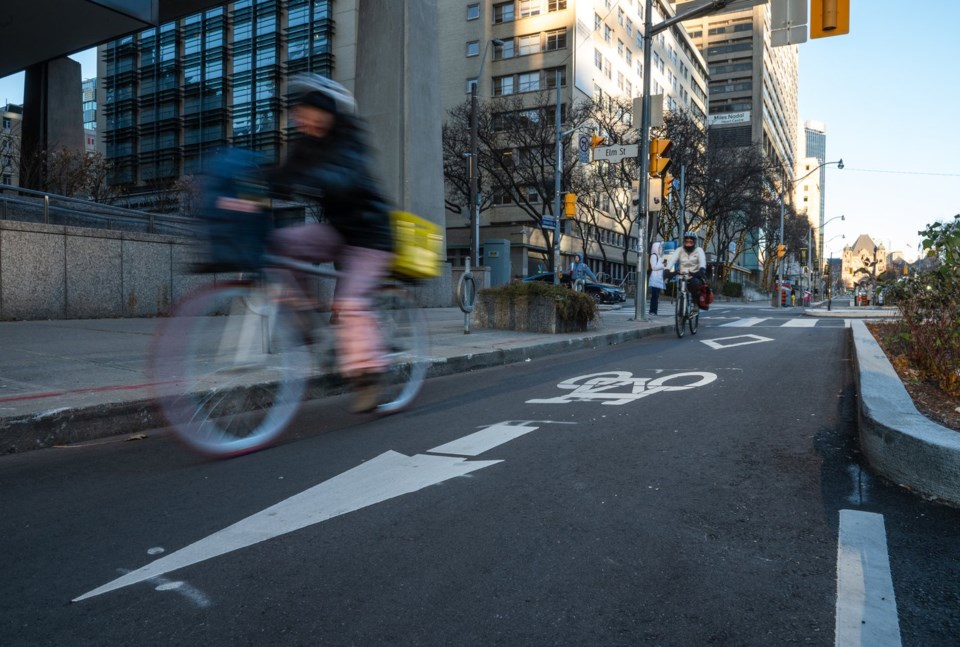TORONTO — The Ontario government says it will appeal a court decision that found a new law to remove three Toronto bike lanes unconstitutional, after a judge ruled the lane removals would put people at an "increased risk of harm and death."
Ontario Superior Court Justice Paul Schabas found the province's plan to remove bike lanes along Bloor Street, Yonge Street and University Avenue violated the Canadian Charter of Rights and Freedoms.
The challenge was brought by the advocacy group Cycle Toronto and two individual cyclists — a university student who relies on the Bloor Street bike lane to get to school and a bike delivery driver who uses the lanes daily.
They asked the court to strike down parts of the law that empowered the province to remove 19 kilometres of protected bike lanes on the three roads.
"The applicants have established that removal of the target bike lanes will put people at increased risk of harm and death which engages the right to life and security of the person," Schabas wrote in his decision.
"The evidence is clear that restoring a lane of motor vehicle traffic, where it will involve the removal of the protected, or separated, nature of the target bike lanes, will create greater risk to cyclists and to other users of the roads."
Dakota Brasier, a transportation ministry spokesperson, said the province plans to appeal the ruling.
"We were elected by the people of Ontario with a clear mandate to restore lanes of traffic and get drivers moving by moving bike lanes off of major roads to secondary roads," Brasier said in an email. "To deliver on that mandate, we will be appealing the court’s decision."
Six cyclists were killed in Toronto last year, all on roads that did not have protected bike lanes, court heard.
As part of the same law, Ontario inked in a requirement that municipalities get provincial approval if they want to remove a lane of vehicle traffic in order to install a bicycle lane.
Michael Longfield, executive director of Cycle Toronto, called the judge's ruling "a full win."
"We won on the facts and on the law. The court accepted our argument that the government’s actions increased the risk of harm to Ontarians, and that doing so without justification breaches our most basic constitutional rights," Longfield said in a statement.
Ford has blamed the Bloor Street, Yonge Street and University Avenue bike lanes for contributing to increased traffic in Toronto and vowed to get the city moving again.
He also made removing the bike lanes a campaign issue during the snap election he called and won in February.
Ford and Toronto Mayor Olivia Chow had been negotiating a compromise for months, with the mayor conveying that she believed there was a solution that would keep the bike lanes and add an extra lane of traffic in each direction on the three roads.
A spokesperson for Chow said Wednesday the city is reviewing the court decision and the impact on its discussions with the province.
"Mayor Chow maintains that the City of Toronto and its elected council should be the ones making decisions about municipal infrastructure," press secretary Zeus Eden said in an emailed statement, noting the city is working to reduce congestion by hiring more traffic agents, speeding up construction and improving public transit.
The provincial government had argued before the court that cycling is a choice, and risk is assumed voluntarily by cyclists while there are alternative forms of transit available, Schabas wrote, concluding that submission "has no merit."
"The evidence establishes that cycling in Toronto is often driven by reasons of reliability and affordability. For many, such as couriers, their livelihood depends on using bicycles," Schabas wrote.
Schabas also noted that the government had received advice from experts, reports from Toronto officials and evidence from the city and elsewhere that removing bike lanes "will not achieve the asserted goal" of the law to reduce traffic.
"The evidence shows that restoring lanes for cars will not result in less congestion, as it will induce more people to use cars and therefore any reduction in driving time will be shortlived, if at all, and will lead to more congestion," Schabas wrote.
"This makes the law arbitrary."
The judge also noted that expert evidence provided by the government did not address whether restoring a vehicle lane will alleviate congestion.
"The evidence presented by the respondent consists of weak anecdotal evidence and expert opinion which is unsupported, unpersuasive and contrary to the consensus view of experts, including the expert evidence, data and studies presented by the applicants," he wrote.
Schabas previously ordered an injunction to keep the government's hands off the bike lanes until he rendered a decision.
Alberta's transportation minister said Wednesday the province is watching the Ontario court ruling with interest. Devin Dreeshen has said in recent months that the Alberta government wasn't ruling out putting forward similar legislation.
— With files from Jack Farrell in Edmonton
This report by The Canadian Press was first published July 30, 2025.
Liam Casey and Rianna Lim, The Canadian Press



